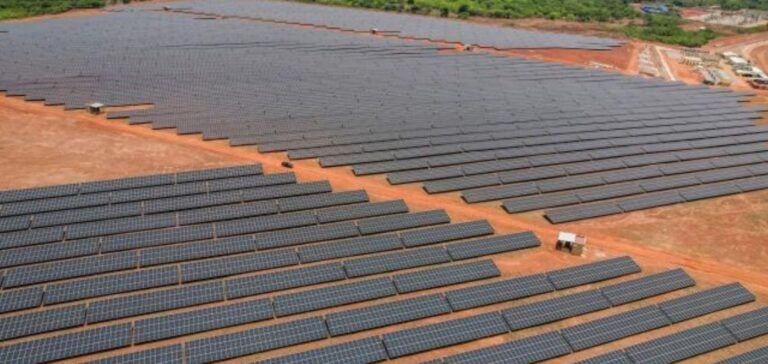Côte d’Ivoire has taken a crucial step in its energy transition with the opening of its first photovoltaic solar power plant in Boundiali. This project, emblematic of the future of renewable energies in the country, aims to reduce dependence on fossil fuels and promote a more sustainable energy mix.
Project background and objectives
Located in the north of Côte d’Ivoire, the Boundiali solar power plant benefits from a hot, dry climate, ideal for solar energy. Franck Alain Yayo, plant operations engineer, points out that irradiance in this region is very high, which optimizes electricity production. Launched in June 2023, the plant comprises 68,000 solar panels on 36 hectares, with the aim of doubling this figure by the end of 2024 to reach a capacity of 80 MWp. The project, costing a total of 75.6 million euros, is financed by Côte d’Ivoire, a German loan and a grant from the European Union.
Perspectives and challenges
The IEA (International Energy Agency) notes that one person in two in sub-Saharan Africa has no access to electricity, despite abundant solar irradiation. Although the continent has doubled its clean energy production capacity in ten years, it accounts for just 2% of global capacity. The Boundiali power plant, which contributes 1% to national output, symbolizes a promising but modest start. Côte d’Ivoire’s energy mix is currently dominated by gas-fired power plants (70%) and hydroelectric plants (30%).
Future commitments and challenges
Côte d’Ivoire is committed to increasing its share of renewable energy to 45% by 2030, including 9% solar power, and to reducing its greenhouse gas emissions by 30%. However, the recent discovery of two oil and gas fields, including the Calao field, underlines the continuing importance of fossil fuels for the country’s energy security. The Minister of Mines, Petroleum and Energy, Sangafowa Coulibaly, believes that these resources will meet the country’s growing energy needs.
Local and Social Impact
The development of the Boundiali solar power plant also has significant social benefits. Around 350 people have been hired since the project began, providing stable employment in a region where work is scarce. Oumar Konaté, a former farmer, is enjoying his new role and the opportunities offered by the project. CI-Energies, in partnership with the French group Eiffage, is training local employees to maintain and operate the plant. Efforts to enhance local skills and provide sustainable employment are essential to the long-term success of Côte d’Ivoire’s energy transition. This pilot project could serve as a model for other similar initiatives in sub-Saharan Africa.
Côte d’Ivoire’s first solar power plant represents a significant step towards a greener, more resilient energy future. By reconciling economic development and environmental protection, the country is showing the way to a successful energy transition.






















